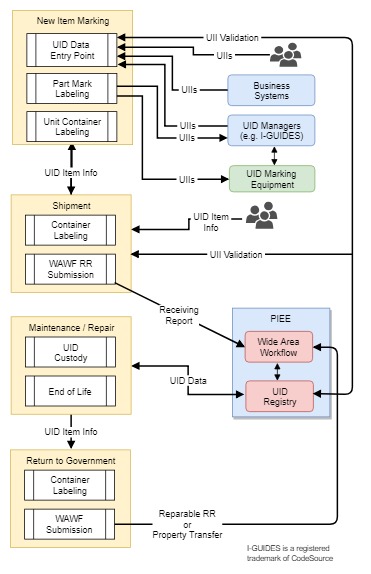Managing the Impacts of IUID and GFP Compliance
The DOD’s Item Unique Identification (IUID/UID) initiative has revolutionized the military’s ability to keep track of what it owns. But it has also created substantial burdens on defense contractors that go far beyond just permanent part marking.
The challenges created by IUID data management fall into four phases of item lifecycle.
- Part Marking – ensuring that Unique Item Identifiers (UII) are valid and unique, while also collecting that data for shipment and other uses.
- Shipping – which includes Mil-Std-129 container marking and submission of UID data to Wide Area Workflow (WAWF) can involve repetitive use of each UII numerous times.
- Bonded Storage – during which the contractor is responsible for temporary storage of items it has sold to the Government, then later, shipment of those items to end users.
- GFP Maintenance and Repair – which requires a contractor to acknowledge custody to the UID Registry of Government Furnished Property (GFP) that it is servicing, then submit UIIs again on a WAWF Reparable Receiving Report (RRR) or Property Transfer (DD1149) when shipping. The need to sometimes add items to the UID Registry or handle end-of-life events (e.g. scrapping and warranty replacements) complicates the requirements. [more...]
Because UID data is integral to all these processes it must be handled accurately and efficiently. This requires a highly integrated solution that is robust and comprehensive, whether it be provided by a single vendor or composed of point solutions from several.
MIL-Comply's modular licensing approach allows it to be applied specifically to the areas of greatest need and work with your existing systems. It can scale up as needs grow and adapt to process changes.
|
|
Get more detailed information, including case studies |
|
|
Keep up to date on MIL-Comply and DOD Compliance Requirements |



